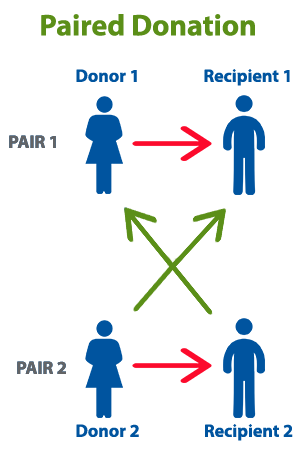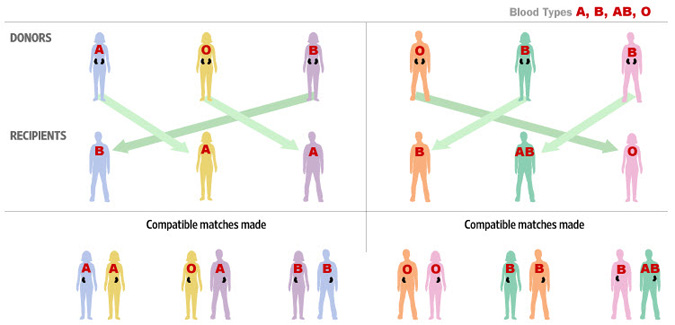What is a Paired Kidney Exchange?
Since 2001, Johns Hopkins Comprehensive Transplant Center has participated in paired kidney exchanges. A paired kidney exchange, also known as a "kidney swap" occurs when a living kidney donor is incompatible with the recipient, and so exchanges kidneys with another donor/recipient pair. Two live donor transplants would occur. Suppose there were two donor/recipient pairs, Donor and Recipient 1 and Donor and Recipient 2:
- Donor 1 would give a kidney to Recipient 2.
- Donor 2 would then give a kidney to Recipient 1.
This kidney paired donation transplant enables two incompatible recipients to receive healthy, more compatible kidneys. All medically eligible donor/recipient pairs may participate in the paired kidney exchange program.

In more complex cases, additional donor/recipient pairs may be used. Here is a diagram showing a three-way kidney exchange.
Participating in the paired kidney exchange program allows for a recipient to receive a better matched kidney, and helps other individuals who would otherwise continue to wait for a matched donor. Approximately 45% of donor/recipient pairs could find a perfectly matched donor by entering the national paired kidney exchange program.
How are donor/recipient pairs matched?
For many years, matching potential donor/recipient pairs was managed through the local hospital, or through partnering with area hospitals. Recently, the Organ Procurement and Transplantation Network started a Kidney Paired Donation program that will find matching donor/recipient pairs throughout the United States. Kidney Transplant India experts anticipate that, each year, an additional 1,000 – 2,000 donations can be performed through this national program.
How long will it take to find a matching donor/recipient pair?
It can take anywhere from one month to two years to find an exchange pair. This depends on the donor/recipient antibody levels, blood type and the number of people in the database.
How does the operation work?
If the surgery is a simple exchange between two donor/recipient pairs, the Kidney Transplant India will typically remove the kidneys from the donors in the morning and transplant to the recipients in the afternoon. There may be times, however, when one transplant surgery may be scheduled a few weeks after the other. If multiple donor/recipient pairs are involved, the process may take several weeks.
If other hospitals are involved, there is a chance that a donor may be asked to travel to their location. If this is the case, the donor will be assigned a coordinator, surgeon and nephrologist at this hospital. Most hospitals will accept a donor's kidney that has been shipped. Research has shown the living donor kidneys can be stored in preservation fluid for up to eight hours and still work effectively.
Can pairs meet?
Donor/recipient pairs do not meet until after the exchange has taken place and only if each person agrees.